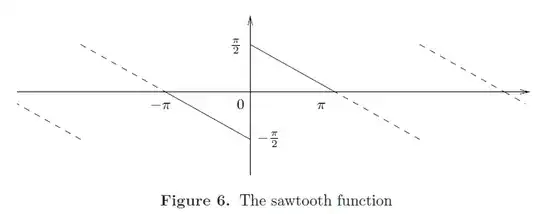My question stems from Exercise $8$, in Chapter $2$ of Stein and Shakarchi's Fourier Analysis. I have verified that $$\frac{1}{2i} \sum_{n\ne 0} \frac{e^{inx}}{n} = \sum_{n\ge 1} \frac{\sin nx}{n}$$ is the Fourier series of the $2\pi$-periodic saw-tooth function defined by $f(0) = 0$, and $$f(x) = \begin{cases} \frac{-\pi-x}{2} & -\pi < x < 0\\ \frac{\pi - x}{2} & 0 < x < \pi\end{cases}$$

The book says:
Note that this function is not continuous. Show that nevertheless, the series converges for every $x$ (by which we mean, as usual, that the symmetric partial sums of the series converge). In particular, the value of the series at the origin, namely $0$, is the average of the values of $f(x)$ as $x$ approaches the origin from the left and the right.
By Dirichlet's test for convergence, I have shown that $\sum_{n\ge 1} \frac{\sin nx}{n}$ converges for all $x\in (-\pi,\pi) \setminus\{0\}$. At $x = 0$, $\sum_{n\ge 1} \frac{\sin nx}{n}$ clearly converges to $0$. So, $\sum_{n\ge 1} \frac{\sin nx}{n}$ converges for all $x\in (-\pi,\pi)$.
Question: The series $\sum_{n\ge 1} \frac{\sin nx}{n}$ converges to $f$, at $0$. Does it also converge to $f$ at other points in $(-\pi,\pi)$? If yes, how can we show this with elementary methods?
Please note that this is only the second chapter of Stein and Shakarchi's Fourier Analysis, so the machinery we can use is limited. In particular, we can't use Dirichlet conditions, etc.
Related questions: Post 1.
Edit(s):
- Integrating the identity suggested by @mathcounterexamples.net from $0$ to $x$, we get $$\sum_{n=1}^N \frac{\sin nx}{n} = -\frac{x}{2} + \frac{\sin Nx}{N} + \int_0^x \sin Nx \cot\frac{x}{2}\, dx$$ I have trouble evaluating the last integral, and don't know how to proceed. For $0 < x < \pi$, we want $$\left|\sum_{n=1}^N \frac{\sin nx}{n} + \frac{x-\pi}{2}\right| =\left|-\frac{\pi}{2} + \frac{\sin Nx}{N} + \int_0^x \sin Nx \cot\frac{x}{2}\, dx\right| \xrightarrow{N\to\infty} 0$$ and for $-\pi < x < 0$, we want $$\left|\sum_{n=1}^N \frac{\sin nx}{n} + \frac{x+\pi}{2}\right| =\left|\frac{\pi}{2} + \frac{\sin Nx}{N} + \int_0^x \sin Nx \cot\frac{x}{2}\, dx\right| \xrightarrow{N\to\infty} 0$$